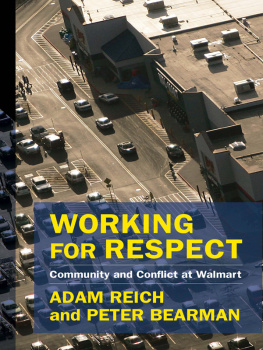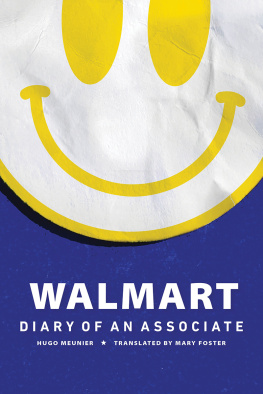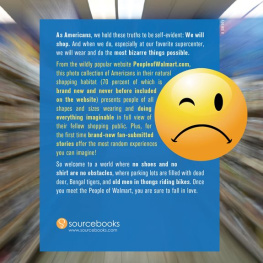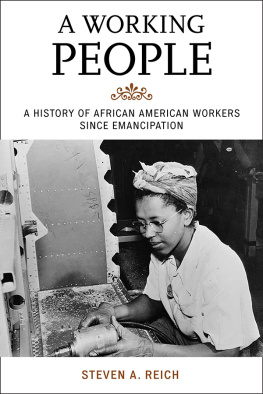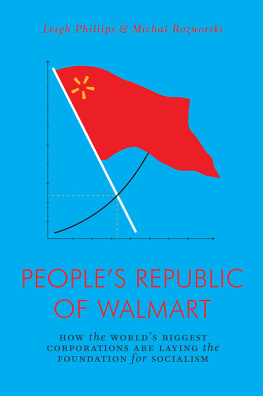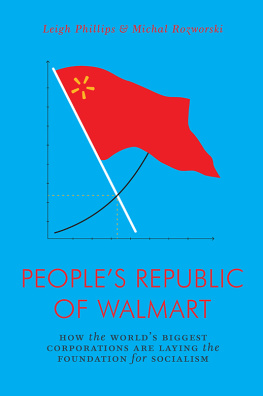Table of Contents
I am obsessed with this book! The prose is riveting. The blend of disparate methods is spectacular. The sheer adventure of student organizers fanning out across the country in a manner reminiscent of Freedom Summer will keep you turning the pages. Taken together, the portrait wrought is simply devastating. Walmart not only demands your labor and your loyalty, it claims your pride and strips you of dignity.
KATHRYN EDIN, COAUTHOR OF $2 A DAY: THE ART OF LIVING ON VIRTUALLY NOTHING IN AMERICA
Walmartthe largest U.S. employeris a symbol for high inequality in America. Its many shop-floor employees are paid as little as possible and have never shared in the huge success and profits of the company. Why cant Walmart workers get a bigger share of the pie they helped create? This book, based on extensive interviews with Walmart workers, helps us understand why a job at Walmart might be the least bad option for many, how workers make sense of their jobs, and the challenges of organizing work at Walmart. Working for Respect is essential reading for a rich sociological understanding of the struggles of low-paid workers pitted against all-powerful corporations in America today.
EMMANUEL SAEZ, UNIVERSITY OF CALIFORNIA, BERKELEY
How do people find and flex their own power to improve their workplaces? What lessons can all of us learn from dogged and creative efforts to organize workers at Walmart, the biggest private employer in the world? What kinds of relationships between organizers and their communities are most likely to lead to organizing breakthroughs? Working for Respect is a gripping reada thoughtful, perceptive, and accessible work that takes a multilayered approach, from in-depth interviews with Walmart workers to brain scans to a crash course in front-line organizing and beyond. This is a book for students of organizing, for academics interested in helping to counter rampant economic inequality, and for anyone who cares about winning material gains and respect for all workers in the age of Trump.
ANNA GALLAND, EXECUTIVE DIRECTOR, MOVEON.ORG
Working for Respect is an extraordinary book, both in its deft and original intertwining of multiple research methods and in the insights it generates.
ERIK OLIN WRIGHT, AUTHOR OF ENVISIONING REAL UTOPIAS
Working for Respect is at once a brilliant analysis of the lives of Walmart workers and an original effort to bridge the tension between scholarly work and activism. Along the way, Reich and Bearman raise the bar for mixed-method research in the social sciences.
MITCHELL DUNEIER, MAURICE P. DURING PROFESSOR OF SOCIOLOGY, PRINCETON UNIVERSITY
Working for Respect is an engaging read that bristles with fresh insights into both the experience of low-wage service sector work and the dilemmas facing the labor movement. It offers an ethnography of what the authors dub Walmartism, as well as an argument about the ways in which social ties centered on trust have the potential to jumpstart social change. A must-read for any sociologist of labor.
RUTH MILKMAN, CUNY GRADUATE CENTER
With Working for Respect, Reich and Bearman issue a rare invitation: to go with them to Walmart, to listen with them to the workers and to the managers who roam the stores, to take in the culture of low-wage work in America, and also to listen to the students who participated in what became the Summer for Respect. This is a gripping book about the relationship between social ties and social change, remarkable for its intelligence and the subtlety of its distinctions. We learn that in the end it is trust rather than good feeling that inspires collective action for social change.
CAROL GILLIGAN, AUTHOR OF IN A DIFFERENT VOICE
WORKING FOR RESPECT
THE MIDDLE RANGE
EDITED BY PETER S. BEARMAN AND SHAMUS R. KHAN
The Middle Range, coined and represented by Columbia sociologist Robert Merton, is a style of work that treats theory and observation as a single endeavor. This approach has yielded the most significant advances in the social sciences over the last half century; it is a defining feature of Columbias department. This book series seeks to capitalize on the impact of approaches of the middle range and to solidify the association between Columbia University and its Press.
The Conversational Firm: Rethinking Bureaucracy in the Age of Social Media, Catherine J. Turco
WORKING FOR RESPECT
COMMUNITY AND CONFLICT AT WALMART
ADAM REICH AND PETER BEARMAN
Columbia University Press
New York
Columbia University Press gratefully acknowledges the generous support for this book provided by Publishers Circle member Harriet Zuckerman.
Columbia University Press
Publishers Since 1893
New York Chichester, West Sussex
cup.columbia.edu
Copyright 2018 Columbia University Press
All rights reserved
E-ISBN 978-0-231-54782-6
Library of Congress Cataloging-in-Publication Data
Names: Reich, Adam D. (Adam Dalton), 1981- author. | Bearman, Peter S.,1956 author.
Title: Working for respect : community and conflict at Walmart / Adam Reich and Peter Bearman.
Description: New York : Columbia University Press, [2018] | Includes bibliographical references and index.
Identifiers: LCCN 2018003817| ISBN 9780231188425 (cloth : alk. paper) | ISBN 9780231547826 (e-book)
Subjects: LCSH: Wal-Mart (Firm)Employees. | Discount houses (Retail trade)United StatesManagementCase studies. | Retail tradeMoral and ethical aspectsUnited States. | CorporationsMoral and ethical aspectsUnited States.
Classification: LCC HF5429.215.U6 R45 2018 | DDC 331.7/613811490973dc23
LC record available at https://lccn.loc.gov/2018003817
A Columbia University Press E-book.
CUP would be pleased to hear about your reading experience with this e-book at .
Cover design: Milenda Nan Ok Lee
Cover photo: Chris Hondros / Getty Images
Peter dedicates this book to Sophie, Adam to his parents.
CONTENTS
O ur debts to others on this project start sometime around the end of January 2014. At the time, Adam had been collaborating with Audra Makuch, then working for the United Food and Commercial Workers International Union (UFCW) as the executive assistant to the regional director, on a project designed to study the structure of social change activism in New York City. One afternoon, as Audra and Adam were driving to an interview on the East Side of New York, they got to talking about how that summer would be the fiftieth anniversary of the Freedom Summer campaign. It occurred to both of them that a project that got college students into the field, organizing on behalf of people working in low-wage jobs, might be able to make an impact.

